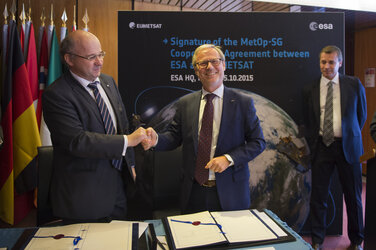

Earth observation contributes to Paris Climate Agreement
Earth observation is already capable of supporting national climate action, but there are many more opportunities on the horizon, according to discussions today among leading scientists and policymakers at ESA’s Living Planet Symposium being held in Bonn, Germany. Satellites, with their global view, have long provided the evidence used to identify trends and document the state of the global climate system.
In particular, Earth observation will contribute to the Agreement’s five-yearly review cycles, known as the Global Stocktake, designed to help raise collective ambition and strengthen further climate action. However, it is at the national level where Earth observation can support action, for example in the reporting of emissions, monitoring carbon sources and sinks, such as forests, and providing crucial local information for the adaptation process.
Read full story: Supporting the Paris Agreement from space





